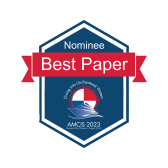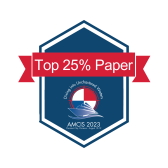Loading...
Paper Type
Complete
Description
Technical professions and industries remain heavily male-dominated. To counteract this imbalance, measures are being taken, including mentoring programs for women. In this study, a literature review is conducted to answer the research question of how women's mentoring programs need to be designed in order to contribute to the reduction of the gender gap. The results of 13 empirical studies from 2013 to 2022 are analyzed and 21 factors influencing the design of women's mentoring programs are identified and grouped under three headings (relationship aspects, content-related aspects, and organizational aspects). On this basis, an exemplary women's mentoring program is discussed, the core of which consists of a hybrid e-mentoring program. While mentoring programs are considered helpful at the individual level, closing the gender gap at the structural level definitely needs more focus from both research and practice.
Paper Number
1472
Recommended Citation
Aufschläger, Lisa Theresia; Kusanke, Kristina; Witte, Anne-Katrin; Kendziorra, Jennifer; and Winkler, Till J., "Women Mentoring Programs to Reduce the Gender Gap in IT Professions A Literature Review and Critical Reflection" (2023). AMCIS 2023 Proceedings. 3.
https://aisel.aisnet.org/amcis2023/soc_inclusion/social_inclusion/3
Women Mentoring Programs to Reduce the Gender Gap in IT Professions A Literature Review and Critical Reflection
Technical professions and industries remain heavily male-dominated. To counteract this imbalance, measures are being taken, including mentoring programs for women. In this study, a literature review is conducted to answer the research question of how women's mentoring programs need to be designed in order to contribute to the reduction of the gender gap. The results of 13 empirical studies from 2013 to 2022 are analyzed and 21 factors influencing the design of women's mentoring programs are identified and grouped under three headings (relationship aspects, content-related aspects, and organizational aspects). On this basis, an exemplary women's mentoring program is discussed, the core of which consists of a hybrid e-mentoring program. While mentoring programs are considered helpful at the individual level, closing the gender gap at the structural level definitely needs more focus from both research and practice.
When commenting on articles, please be friendly, welcoming, respectful and abide by the AIS eLibrary Discussion Thread Code of Conduct posted here.





Comments
SIG SI